|
 Nederlands /
Dutch Nederlands /
Dutch
Parasitica, Ichneumon
wasps, Ichneumonidae
Hymenoptera. The bees, bumblebees, ants, wasps and saw flies belong to that
order.
Hymenoptera is divided into different subordes. Namely suborder Symphyta
(This group has no waist, sawflies) and
suborder Apocrita. Apocrita is also divided into two groups. Namely: Parasitica and
Aculeta.
Parasitica: wasps or parasitic hymenoptera. The females have an ovipositor, with
the ovipositor they lay eggs into or near larvae. These larvae are eaten by the wasp larvae. There are several families.
The largest group are the ichneumon wasp (Ichneumonidae). Other groups are: Braconidae,
chalcid wasps (Chalcidoidea), Gasteruptiidae, gall wasps (Cynipoidea). The plant
galls of gall wasps develop, when the eggs are laid.
Aculeata: In this group the ovipositor is is modified into an
stinger. With this stinger they can defend themselves (bees) or they can
stun a prey. In this group are also wasps with parasitic larvae. Spider
wasps look like ichneumon wasps, but have a sting to stun their hosts.
Jewel wasps (Chrysididae) have a sting too.
|
|
Ichneumon wasps, Ichneumonidae
There are many species in the world. (60.000 species worldwide) Ichneumon
wasps are parasitoids of other insects. Their abdomen is very
elongated and have long antennae (at least 16 segments)
They are solitary. There are many subfamilies.
|
Anomaloninae
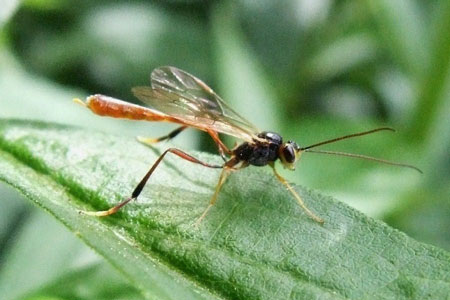 .. ..
 A small Ichneumon wasp. Subfamily
Anomaloninae.
Family Ichneumon wasps, Ichneumonidae. A small Ichneumon wasp. Subfamily
Anomaloninae.
Family Ichneumon wasps, Ichneumonidae.
They are Endoparasitoids (koinobiont) of moths,
butterflies and beetles (larvae).
They have a slender abdomen. 38 genera. On this photo: on a leaf of a Goldenrod.
Photo 7-6-2009. |
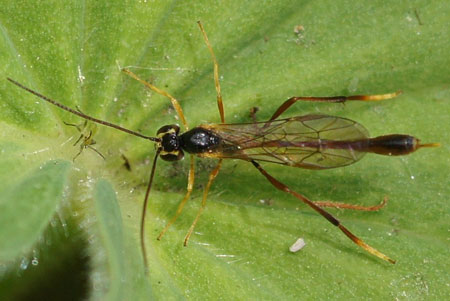 .. ..
 . .
 An other small Ichneumon wasp. Subfamily
Anomaloninae.
Family Ichneumon wasps, Ichneumonidae. Photos
14-5-2011. An other small Ichneumon wasp. Subfamily
Anomaloninae.
Family Ichneumon wasps, Ichneumonidae. Photos
14-5-2011. |
Banchinae
 .. ..
 . .
 Banchinae spec. Maybe Banchinae Lissonota. Subfamily Banchinae. Family Ichneumon wasps,
Ichneumonidae. Banchinae spec. Maybe Banchinae Lissonota. Subfamily Banchinae. Family Ichneumon wasps,
Ichneumonidae.
Female with a long ovipositor. On the trunk of a dead apple tree. This is not without danger, because there also lives a
Marpissa muscosa (a large jumping spider).
Photos 12-6-2011. |
 .. ..
 Exetastes
adpressorius. Tribe Banchini. Subfamily Banchinae. Family Ichneumon wasps,
Ichneumonidae. Exetastes
adpressorius. Tribe Banchini. Subfamily Banchinae. Family Ichneumon wasps,
Ichneumonidae.
About 10 mm. Photo: 22-7-2012. |
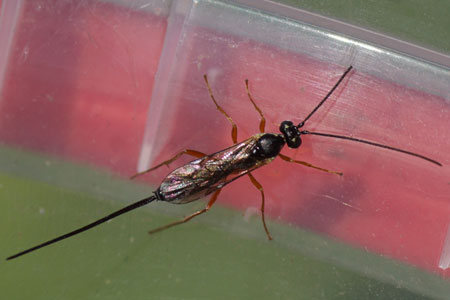 .. ..  Lissonota spec. Tribe Atrophini. Subfamily
Banchinae. Family Ichneumon wasps, Ichneumonidae.
Lissonota spec. Tribe Atrophini. Subfamily
Banchinae. Family Ichneumon wasps, Ichneumonidae.
Unable to identify the species. There are already more than thirty species of this genus in the Netherlands and more than 300 in the world. About 10 mm. Photo: 8-7-2021. |
Campopleginae (Link
American Campoplerinae)
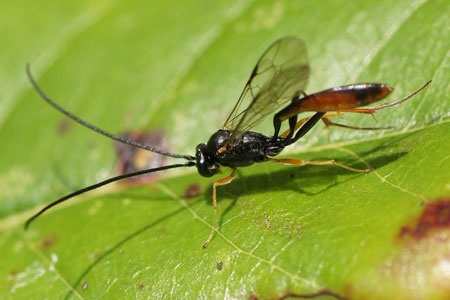 .. ..  . .
 Subfamilie
Campopleginae. Maybe Casinaria spec. Family
Ichneumon wasps, Ichneumonidae. Subfamilie
Campopleginae. Maybe Casinaria spec. Family
Ichneumon wasps, Ichneumonidae.
Gergely: To my opinion, it is a Casinaria
or something closely related in Campopleginae...
Photos 5-11-2011. |
 Dusona spec. Subfamilie
Campopleginae. Family
Ichneumon wasps, Ichneumonidae. Photos 2-6-2012. Dusona spec. Subfamilie
Campopleginae. Family
Ichneumon wasps, Ichneumonidae. Photos 2-6-2012. |
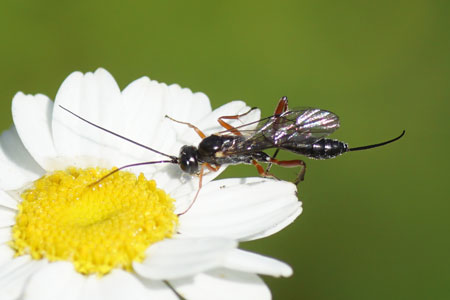 Rhimphoctona spec. Subfamily
Campopleginae. Family
Ichneumon wasps, Ichneumonidae.
Rhimphoctona spec. Subfamily
Campopleginae. Family
Ichneumon wasps, Ichneumonidae.
A genus that must be identified with the aid of a microscope. Even Rhimhoctona isn't quite sure. For the Netherlands I currently only see Rhimphoctona melanura, but there are more species. Photo 15-6-2022. Fons Verheyde thanks for the identification and explanation.
|
Ctenopelmatinae
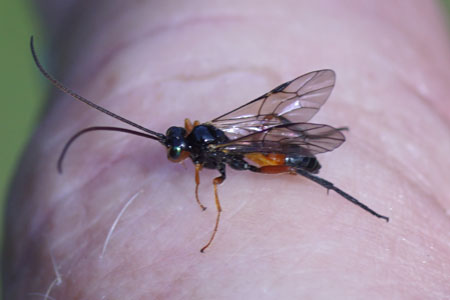 Scolobates auriculatus. Tribe
Scolobatini. Subfamily Ctenopelmatinae. Family
Ichneumon wasps, Ichneumonidae.
Scolobates auriculatus. Tribe
Scolobatini. Subfamily Ctenopelmatinae. Family
Ichneumon wasps, Ichneumonidae.
Small. Here on my thumb. Black with an orange-red face and anterior abdomen. Europe, North America. Photo 19-6-2025. |
Cryptinae
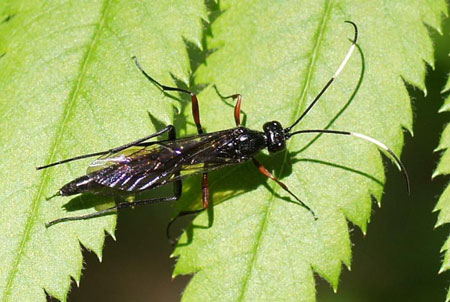 .. ..
 . .
 Echthrus-reluctator. Tribe Aptesini. Subfamily
Cryptinae. Family Ichneumon wasps, Ichneumonidae.. Male. Photographed in the dunes about 4 km from our house.
Echthrus-reluctator. Tribe Aptesini. Subfamily
Cryptinae. Family Ichneumon wasps, Ichneumonidae.. Male. Photographed in the dunes about 4 km from our house.
Female with a partial red abdomen. Black antenna with wide white ring. Partially red legs. Length about 12-15 mm. April - June.
Photos 27-5-2013. Wasp determined after seven years by Fons Verheyde !! |
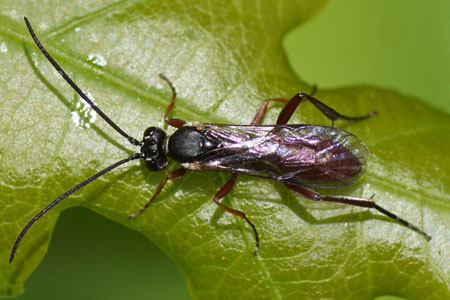 .. ..
 . .
 Sphecophaga vesparum. Tribe
Cryptini. Subfamily Cryptinae. Family Ichneumon wasps, Ichneumonidae..
Sphecophaga vesparum. Tribe
Cryptini. Subfamily Cryptinae. Family Ichneumon wasps, Ichneumonidae..
Sphecophaga vesparum often parasitizes nests of the wasps Vespula vulgaris and Vespula germanica. There are two forms. Large winged males and females and small brachyptere (short winged) females.
Photos 10-5-2020. Determined by Fons Verheyde !! |
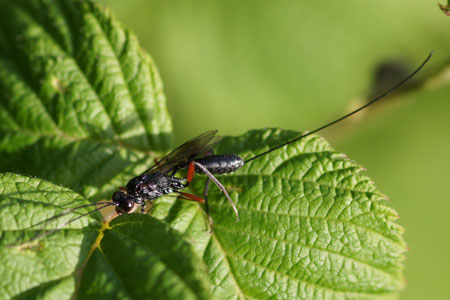 .. ..
 Stenarella spec. Tribe
Cryptini. Subfamily Cryptinae. Family Ichneumon wasps, Ichneumonidae.. Stenarella spec. Tribe
Cryptini. Subfamily Cryptinae. Family Ichneumon wasps, Ichneumonidae..
Looks like a female Stenarella sp.,
domator or closely related. I have
specimens from Finland with and without a white ring on the antennae...
Gergely Várkonyi
Female with a long ovipositor. Thanks Gergely. Photos 4-6-2011. |
Diplazontinae
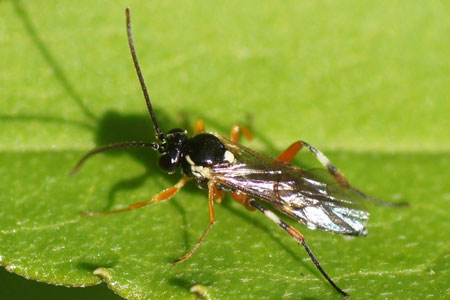 .. ..
 . .
 Diplazon laetatorius. Subamily
Diplazontinae. Family Ichneumon wasps, Ichneumonidae. Diplazon laetatorius. Subamily
Diplazontinae. Family Ichneumon wasps, Ichneumonidae.
A black wasp with orange legs. Cream: scutellum,
line along the side of the thorax, the eyes and antennae and bands on the shins of the hind legs. On the shins of the hind legs are
also black bands. The lower part of the rear legs is black.
Length about 7 mm.
April - October.
Diplazon laetatorius lays eggs in the larvae of hoverflies.
Photos 4-9-2012. |
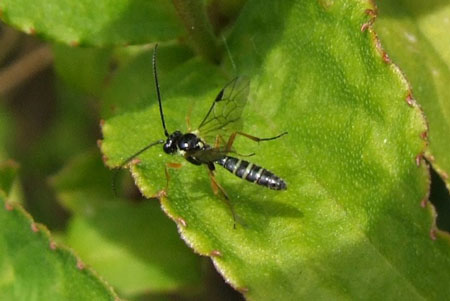 .. ..
 . .
 Ichneumon wasp. Probably Syrphophilus
tricinctorius. Subamily Diplazontinae. Family Ichneumon wasps,
Ichneumonidae. Ichneumon wasp. Probably Syrphophilus
tricinctorius. Subamily Diplazontinae. Family Ichneumon wasps,
Ichneumonidae.
They are small and mobile. You must be lucky,
to get a good photo. I always see them in spring. Photos 20-4-2008. |
Ichneumoninae
More Ichneumon wasps from the subfamily
Ichneumoninae from
America.
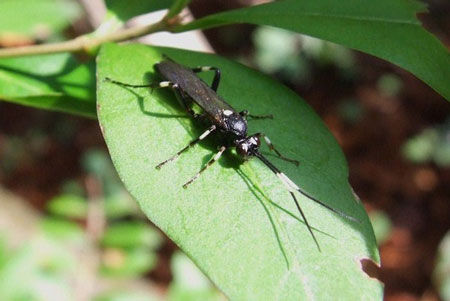 .. ..
 Achaius oratorius. Subfamily
Ichneumoninae. Family Ichneumon wasps, Ichneumonidae. Achaius oratorius. Subfamily
Ichneumoninae. Family Ichneumon wasps, Ichneumonidae.
A black icheumon wasp
with white bands around the legs and antennae, with a white scutellum and with white spots next to the eyes.
Difference male, female. The female has a black face. The face of the male is white.
About 15 mm. June - September.
Photos: 23-11-2009. |
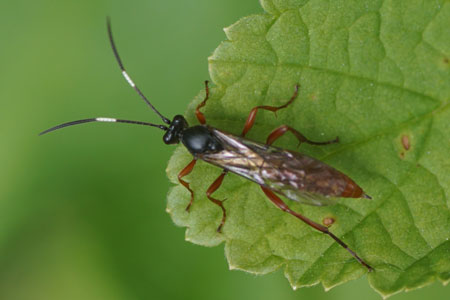 .. ..
 Aoplus. Subfamily Ichneumoninae. Family Ichneumon wasps,
Ichneumonidae.
Aoplus. Subfamily Ichneumoninae. Family Ichneumon wasps,
Ichneumonidae.
The species in the Netherlands are Aoplus castaneus, Aoplus defraudator, Aoplus ochropis, Aoplus personatus, Aoplus ruficeps, Aoplus theresae. Maybe this is an Aoplus ochropis. But that is not certain. Female with a short ovipositor. Thanks to Fons Verheyde. Photos:
18-5-2019. |
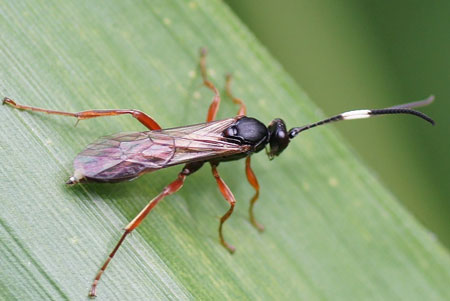 Aoplus ochropis. Subfamily
Ichneumoninae. Family Ichneumon wasps, Ichneumonidae. Aoplus ochropis. Subfamily
Ichneumoninae. Family Ichneumon wasps, Ichneumonidae.
A black icheumon wasp with red legs and a white band around the antennas. Difference male,
female: The female has a black face. The face of the male is white.
The ovipositor of the female is very short. The bottom of the black
scutellem has a red glow, sometimes, the bottom is whitish.
Photo:
5-8-2015. |
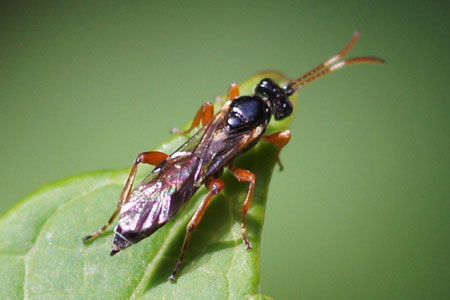 Barichneumon
anatorius. Tribe Ichneumonini. Subfamily Ichneumoninae. Family Ichneumon wasps,
Ichneumonidae.
Photo 11-9-2010. Barichneumon
anatorius. Tribe Ichneumonini. Subfamily Ichneumoninae. Family Ichneumon wasps,
Ichneumonidae.
Photo 11-9-2010. |
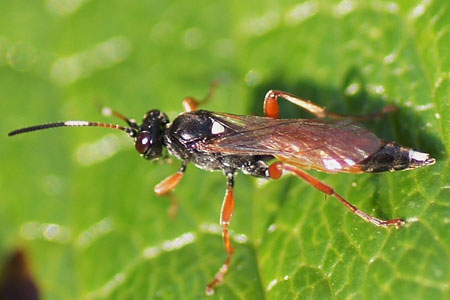 Chasmias motatorius. Female. Tribe
Ichneumonini. Subfamily Ichneumoninae. Family Ichneumon wasps,
Ichneumonidae. Chasmias motatorius. Female. Tribe
Ichneumonini. Subfamily Ichneumoninae. Family Ichneumon wasps,
Ichneumonidae.
Only one photo and then it was flown away. The first part of the antennas is orange. The middle part is white and
the last part is black. The body is black. The scutellum and the end of the abdomen are white. An orange band around the abdomen and orange legs.
Photo
28-9-2014. |
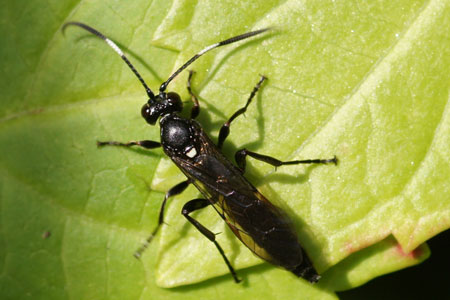 .. ..
 . .  Coelichneumon sinister. male Subfamily
Ichneumoninae. Family
Ichneumon wasps, Ichneumonidae.
Photos 11- 9-2010. Coelichneumon sinister. male Subfamily
Ichneumoninae. Family
Ichneumon wasps, Ichneumonidae.
Photos 11- 9-2010. |
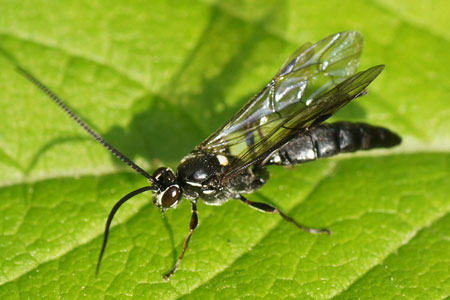 .. ..
 . .  Coelichneumon sugillatorius. Male.
Subfamily Ichneumoninae. Family Ichneumon wasps, Ichneumonidae.
Photos 5-5-2014. Coelichneumon sugillatorius. Male.
Subfamily Ichneumoninae. Family Ichneumon wasps, Ichneumonidae.
Photos 5-5-2014. |
 .. ..
 Cratichneumon. Subfamily
Ichneumoninae.
Family Ichneumon wasps, Ichneumonidae. Cratichneumon. Subfamily
Ichneumoninae.
Family Ichneumon wasps, Ichneumonidae.
Comments Camille Thirion: 6-8 mm possible Cratichneumon culex female
7-10 mm Cratichneumon nigritarius or fabricator. Photos 14-5-2011 |
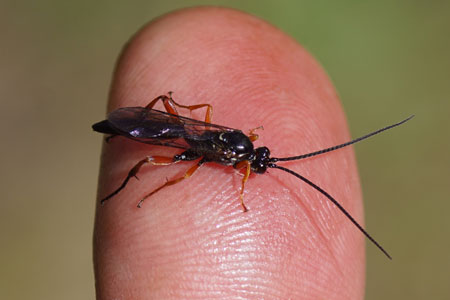 Cratichneumon. male Subfamily Ichneumoninae.
Family Ichneumon wasps, Ichneumonidae.
Cratichneumon. male Subfamily Ichneumoninae.
Family Ichneumon wasps, Ichneumonidae.
Photo 11-7-2022. |
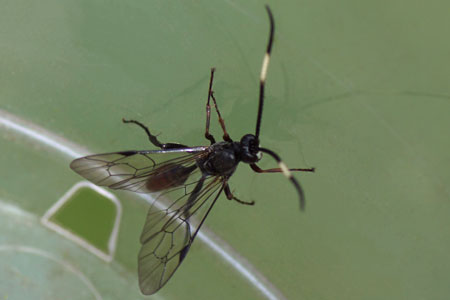 .. ..
 Crypteffigies albilarvatus. Subfamily
Ichneumoninae.
Family Ichneumon wasps, Ichneumonidae.
Crypteffigies albilarvatus. Subfamily
Ichneumoninae.
Family Ichneumon wasps, Ichneumonidae.
Photos 1-5-2021 (Male) |
 .. ..
 Crypteffigies lanius. Subfamily
Ichneumoninae.
Family Ichneumon wasps, Ichneumonidae. Crypteffigies lanius. Subfamily
Ichneumoninae.
Family Ichneumon wasps, Ichneumonidae.
A small Ichneumon wasp.
Photos 26-4-2011 (Male). |
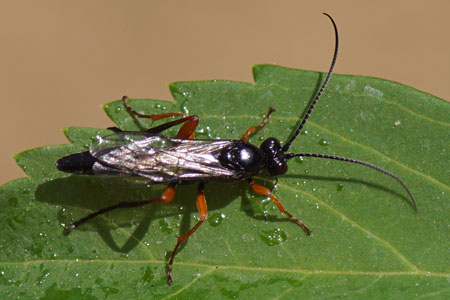 .. ..
 Eurylabus. Subfamily Ichneumoninae.
Family Ichneumon wasps, Ichneumonidae.
Eurylabus. Subfamily Ichneumoninae.
Family Ichneumon wasps, Ichneumonidae.
Two species in the Netherlands: Eurylabus torvus and Eurylabus tristis. Photos
17-6-2023 (Male) |
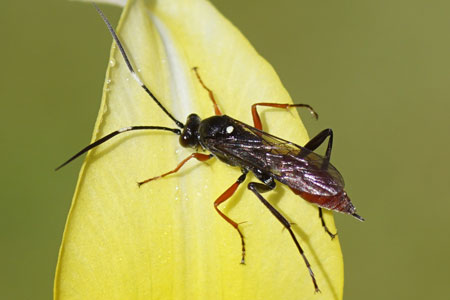 .. ..
 Hoplismenus. Female.
Subfamily Ichneumoninae. Family Ichneumon wasps, Ichneumonidae.
Hoplismenus. Female.
Subfamily Ichneumoninae. Family Ichneumon wasps, Ichneumonidae.
The females of Hoplismenus bidentatus and Hoplismenus bispinatorius are indistinguishable from a photograph. Photos
30-4-2023 |
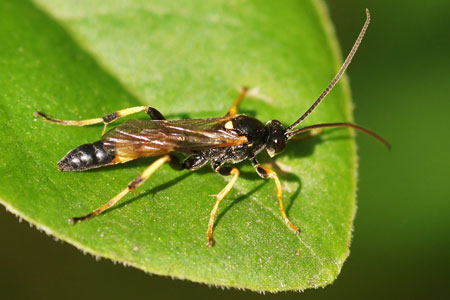 .. ..
 . .  . .  Ichneumon
bucculentus. Subfamily Ichneumoninae.
Family Ichneumon wasps, Ichneumonidae. Male. Photos 9-7-10. Ichneumon
bucculentus. Subfamily Ichneumoninae.
Family Ichneumon wasps, Ichneumonidae. Male. Photos 9-7-10. |
 Ichneumon confusor. Subfamily
Ichneumoninae.
Family Ichneumon wasps, Ichneumonidae.
Ichneumon confusor. Subfamily
Ichneumoninae.
Family Ichneumon wasps, Ichneumonidae.
Fotos 1-4-2014. |
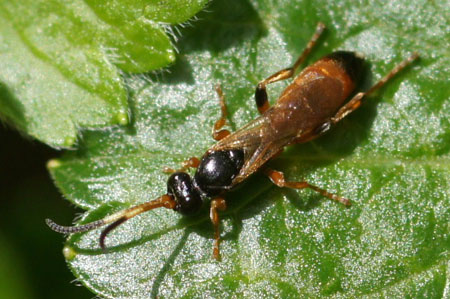 .. ..
 . .  . .
 Ichneumon oblongus Subfamily
Ichneumoninae. Family Ichneumon wasps, Ichneumonidae.
Photos 10-4-2011, 2-7-2012. Ichneumon oblongus Subfamily
Ichneumoninae. Family Ichneumon wasps, Ichneumonidae.
Photos 10-4-2011, 2-7-2012. |
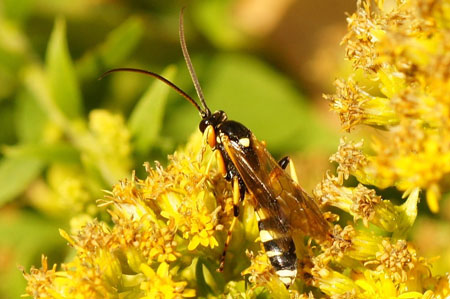 .. ..
 . .  Ichneumon sarcitorius. Subfamily
Ichneumoninae. Family Ichneumon wasps, Ichneumonidae. Male.
Photos15-9-2014. Ichneumon sarcitorius. Subfamily
Ichneumoninae. Family Ichneumon wasps, Ichneumonidae. Male.
Photos15-9-2014. |
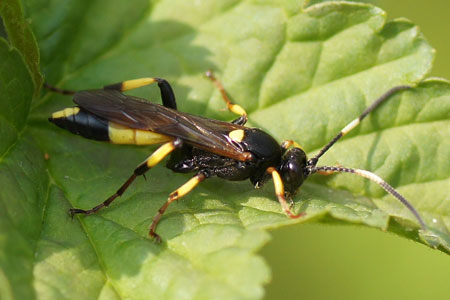 .. ..  Ichneumon stramentor. Subfamily
Ichneumoninae.
Family Ichneumon wasps, Ichneumonidae.
Photos 2-4-2012. The females hibernate under bark, sometimes in houses. More information
in Dutch on Waarneming. Ichneumon stramentor. Subfamily
Ichneumoninae.
Family Ichneumon wasps, Ichneumonidae.
Photos 2-4-2012. The females hibernate under bark, sometimes in houses. More information
in Dutch on Waarneming.
|
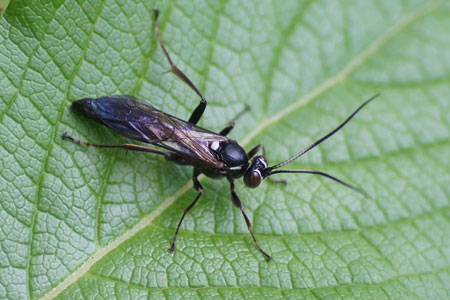 .. ..
 Hepiopelmus melanogaster. Male. Subfamily
Ichneumoninae.
Family Ichneumon wasps, Ichneumonidae. Hepiopelmus melanogaster. Male. Subfamily
Ichneumoninae.
Family Ichneumon wasps, Ichneumonidae.
It looks like a Coelichneumon. Also a black ichneumon wasp. The
scutelum is white. Along the eyes and on the shoulders a white stripe. About 18 mm.
Photos: 13-8-2013. |
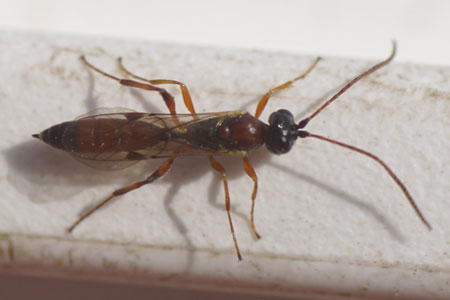 .. ..
 . .
 . .  Diadromus collaris. Female. Subfamily Ichneumoninae.
Family Ichneumon wasps, Ichneumonidae.
Diadromus collaris. Female. Subfamily Ichneumoninae.
Family Ichneumon wasps, Ichneumonidae.
Red-brown with black. Legs and antennas (first segment thick and black) for the most part yellow-brown. About 6-7 mm.
Parasitic on Diamondback Moth (Plutella xylostella). Photos: 12-4-2019. |
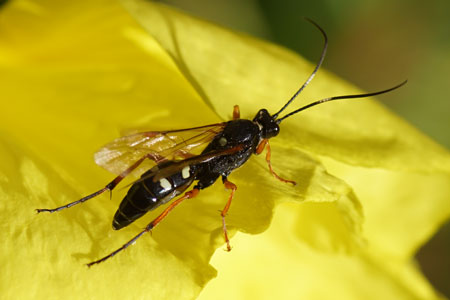 .. ..
 Diphyus
quadripunctorius. Tribe Ichneumonini.
Subfamily Ichneumoninae.
Family Ichneumon wasps, Ichneumonidae. Female.
Diphyus
quadripunctorius. Tribe Ichneumonini.
Subfamily Ichneumoninae.
Family Ichneumon wasps, Ichneumonidae. Female.
A black wasp with orange legs. The female with four white spots on the back body. The male with two yellow bands. The female has white bands on the black antennae. No visible
ovipositor. May to August. Females hibernate. Photos 25-6-2020. |
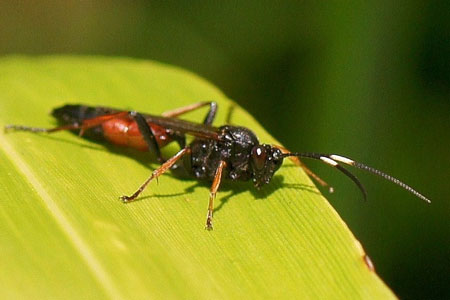 .. ..
 . .
 Patrocloides sputator. Tribe
Ichneumonini.
Subfamily Ichneumoninae.
Family Ichneumon wasps, Ichneumonidae. Female. Patrocloides sputator. Tribe
Ichneumonini.
Subfamily Ichneumoninae.
Family Ichneumon wasps, Ichneumonidae. Female.
Black with red shins and a red band around the
abdomen.
Photos 19-10-2012. |
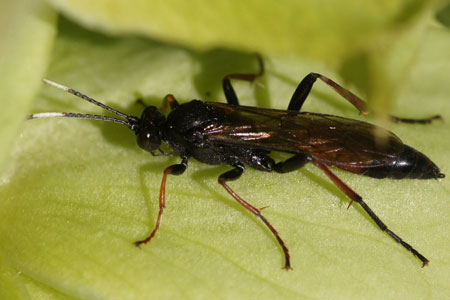 .. ..
 Stenichneumon culpator. Tribe
Ichneumonini.
Subfamily Ichneumoninae.
Family Ichneumon wasps, Ichneumonidae. Female. Stenichneumon culpator. Tribe
Ichneumonini.
Subfamily Ichneumoninae.
Family Ichneumon wasps, Ichneumonidae. Female.
Difficult for it is very simiilar to the Patrocloides sputator. Black with red shins and a red band around the
abdomen.
According to Camille Thirion the abdomen end is that of Stenichneumon!: Abdomen end of Patrocloides sputator =
Amblypygi.
Head narrowed behind at Stenicheumon culpator. Very strong spine of coxa III in the medium of the coxa female
culpator. (coxa
III is the first segment of the hind leg near the body).
The spine of the coxa isn't visible in these photos.
Photos 25-3-2014. |
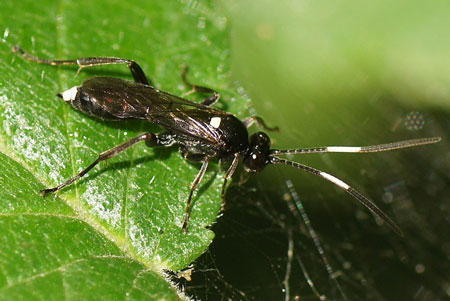 .. ..
 . .
 . .
 Vulgichneumon saturatorius nigripedis. Tribe
Ichneumonini.
Subfamily Ichneumoninae.
Family Ichneumon wasps, Ichneumonidae. Vulgichneumon saturatorius nigripedis. Tribe
Ichneumonini.
Subfamily Ichneumoninae.
Family Ichneumon wasps, Ichneumonidae.
The similar Vulgichneumon saturatorius and
Vulgichneumon bimaculatus have red legs.
The size of this Ichneumon wasp is about 11, 12 mm. Photos 4-9-2012. |
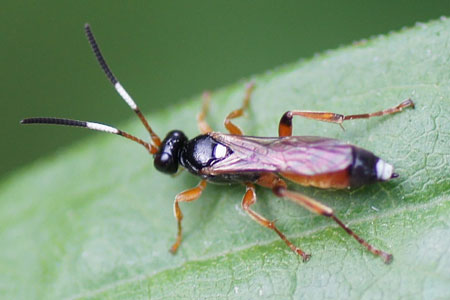 .. ..
 . .  Vulgichneumon trifarius.
Tribe Ichneumonini.
Subfamily Ichneumoninae.
Family Ichneumon wasps, Ichneumonidae.
Vulgichneumon trifarius.
Tribe Ichneumonini.
Subfamily Ichneumoninae.
Family Ichneumon wasps, Ichneumonidae.
Lower part antenna orange-red, middle white, top black. A white scutellum. Photos 11-10-2014. |
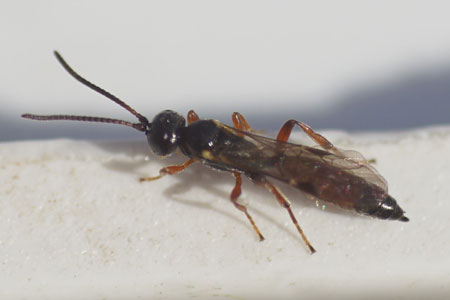 .. ..
 Tribe
Phaeogenini.
Subfamily Ichneumoninae.
Family Ichneumon wasps, Ichneumonidae. Tribe
Phaeogenini.
Subfamily Ichneumoninae.
Family Ichneumon wasps, Ichneumonidae.
A small female ichneumon wasp from about 5 mm. |
Mesochorinae.
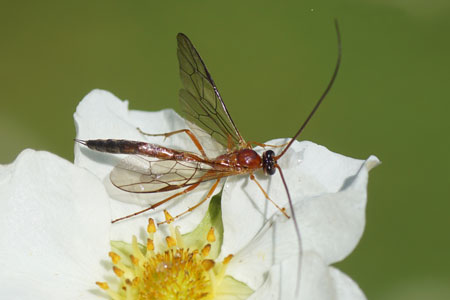 Cidaphus alarius. Male. Subfamily Mesochorinae.
Family Ichneumon wasps, Ichneumonidae.
Cidaphus alarius. Male. Subfamily Mesochorinae.
Family Ichneumon wasps, Ichneumonidae.
A slender orange Ichneumon wasp. Photo
12-5-2024. |
Metopiinae.
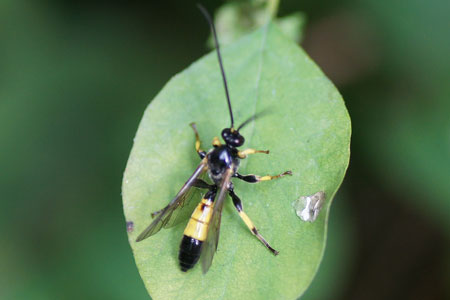 Colpotrochia cincta. Subfamily
Metopiinae.
Family Ichneumon wasps, Ichneumonidae. Colpotrochia cincta. Subfamily
Metopiinae.
Family Ichneumon wasps, Ichneumonidae.
A black ichneumon wasp. The abdomen and legs have
pale yellow bands.
The size of this Ichneumon wasp is about 11 mm.
June - August. Photo 18-8-2013. |
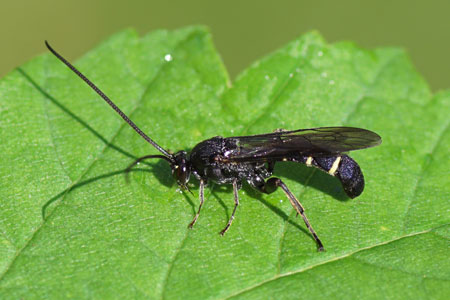 Metopius. Onderfamilie
Metopiinae. Subfamily Metopiinae.
Family Ichneumon wasps, Ichneumonidae.
Metopius. Onderfamilie
Metopiinae. Subfamily Metopiinae.
Family Ichneumon wasps, Ichneumonidae.
A black ichneumon wasp. The abdomen with yellow stripes. In the Nederlands
there are similar species: Metopius anxius, Metopius citratus, Metopius croceicornis, Metopius dentatus, Metopius dissectorius, Metopius fuscipennis, Metopius interruptus, Metopius leiopygus, Metopius necatorius, Metopius pinatorius, Metopius vespoides.
The size of this Ichneumon wasp is about 2 cm. Photo 30-7-2021. |
Ophionae
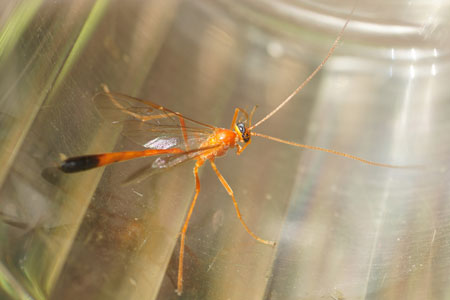 .. ..
 Enicospilus spec. Tribe
Enicospilini. Subfamily Ophioninae.
Family Ichneumon wasps, Ichneumonidae. Enicospilus spec. Tribe
Enicospilini. Subfamily Ophioninae.
Family Ichneumon wasps, Ichneumonidae.
In the Netherlands, there are six species: E. combustus, E. merdarius, E.
ramidulus, E. repentinus, E. tournieri, E. undulatus.
Deze wesp was ongeveer 2 cm. Photos 24-8-2016.
 Enicospilus genus is distinguished by the two orange spots on the wings (indicated by two arrows).
Enicospilus genus is distinguished by the two orange spots on the wings (indicated by two arrows). |
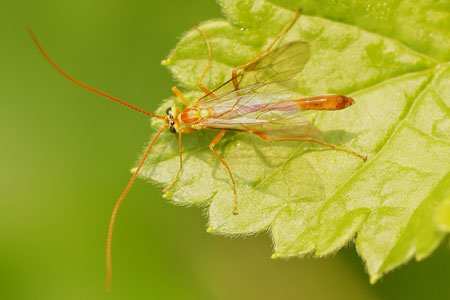 .. ..
 . .  Ophion
minutus. Tribe Ophionini. Subfamily Ophioninae.
Family Ichneumon wasps, Ichneumonidae. Ophion
minutus. Tribe Ophionini. Subfamily Ophioninae.
Family Ichneumon wasps, Ichneumonidae.
Not sure, because there are more similar species. However, this
species is active this time. Furthermore, they can also be confused with Netelia species.
However, the wing veins of these wasps is different.
This is a relatively small species. I also see larger species, but they
don't want to sit still up till now. A light orange Ichneumon wasp with yellow markings on the thorax. Male, because the females have an ovipositor.
Host: caterpillars.
Length about 11 - 15 mm. April - June. Photos 24-4-2014. |
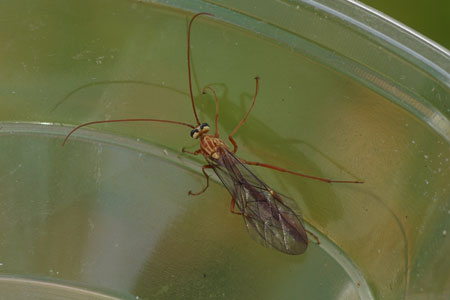 .. ..
 Ophion obscuratus. Tribe
Ophionini. Subfamily Ophioninae.
Family Ichneumon wasps, Ichneumonidae.
Ophion obscuratus. Tribe
Ophionini. Subfamily Ophioninae.
Family Ichneumon wasps, Ichneumonidae.
Unlike the Ophion minutus this species occurs also late in the year. If they were photographed between October and February there is no doubt. Photos earlier in the year may be of a different kind. I found this wasp on our window. In the first photo it is in a container. Then it eats of honey that I had put on a leaf.
Caterpillars of various species from the owlet moths (Noctuidae) are used as hosts. Length approximately 15-22 mm. Whole year. Photos 11-11-2023. |
Pimplinae.
The females that I have photographed are recognizable by the sturdy, semi-long (except
Dolichomitus), straight ovipositor. Book
about Pimplinae.
 .. ..
 . .
 Dolichomitus complex Tribus Ephialtini. Subfamily
Pimplinae.
Family Ichneumon wasps, Ichneumonidae.
Dolichomitus complex Tribus Ephialtini. Subfamily
Pimplinae.
Family Ichneumon wasps, Ichneumonidae.
Dolichomitus complex from the subfamily Pimplinae contains next to Dolichomitus also closely related genera such as Ephialtes, Paraperithous and Liotryphon. With in general the characteristics: Black body with orange legs and long ovipositor.
The long ovipositor makes it easy to confuse with species from the subfamily Banchinae.
They are very common and difficult to identify by species. Photos 19-6-2020.
Link to a lot of information from Kees Zwakhals: Dolichomitus complex
Thanks to Fons Verheyde. |
 Ichneumon wasp. Male. Subfamily
Pimplinae.
Family Ichneumon wasps, Ichneumonidae. Ichneumon wasp. Male. Subfamily
Pimplinae.
Family Ichneumon wasps, Ichneumonidae.
A beautiful large Ichneumon wasp. Unfortunately a name isn't possible.
The
answer of Pierre-Nicolas from Belgium was: A male of Pimplinae like
Dolichomitus, Liotryphon, Ephialtes,... |
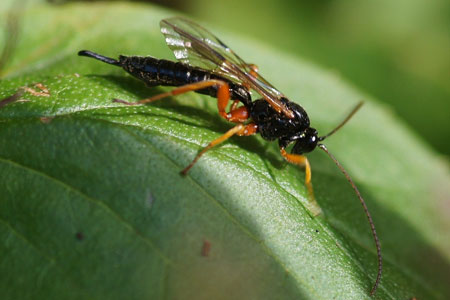 .. ..
 Apechthis compunctor Subfamily
Pimplinae.
Family Ichneumon wasps, Ichneumonidae. Apechthis compunctor Subfamily
Pimplinae.
Family Ichneumon wasps, Ichneumonidae.
An ichneumon wasp of the genus genus Pimplinae. I am glad it was possible to
determine this species.
Length: 7 - 15 mm. June - October.
Photos 4-9-2010, 3-10-2013.
|
Genus Pimpla. Tribe Pimplini. Subfamily Pimplinae. Family Ichneumon wasps,
Ichneumonidae. Difficult to indentify species. Species in the Netherlands aren: Pimpla
contemplator, Pimpla flavicoxis, Pimpla illecebrator, Pimpla insignatoria, Pimpla
melanacrias, Pimpla murinanae, Pimpla processioneae, Pimpla rufipes, Pimpla
spuria, Pimpla turionellae.
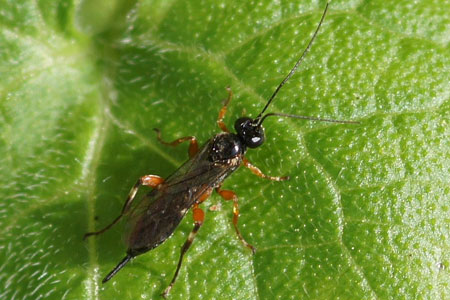 ... ...
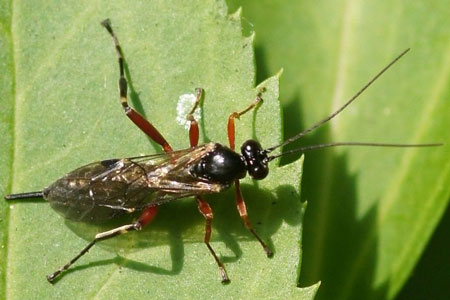
Pimpla spec. Female Photos
26-9-2010, 23-5-2010.
|
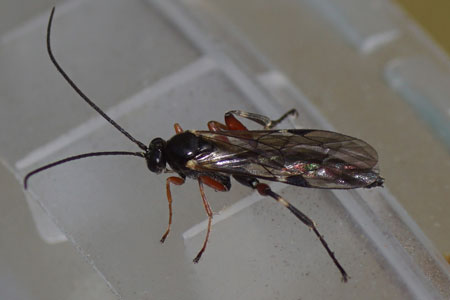 Pimpla spec. Make.
Photo 11-5-2022.
Pimpla spec. Make.
Photo 11-5-2022. |
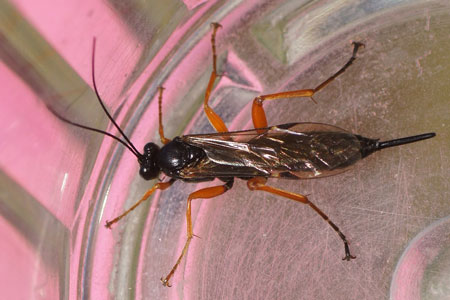 .. ..
 Pimpla
probably Pimpla rufipes. Tribe
Pimplini. Subfamily Pimplinae. Family Ichneumon wasps, Ichneumonidae. Pimpla
probably Pimpla rufipes. Tribe
Pimplini. Subfamily Pimplinae. Family Ichneumon wasps, Ichneumonidae.
The females of Pimpla rufipes can be recognized by their size and the completely straight ovipositor. Hind tibiae and tarsi sometimes darker colored. The similar Buathra laborator always has orange hind tibiae and tarsi. Males cannot be distinguished from other Pimplinae and Ichneumoninae species. The antennae are black. Length approximately 15 mm. Photo 27-8-2013. |
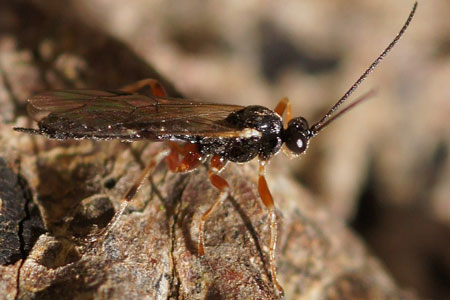 .. ..
 Polysphincta group
of genera in Ephialtini (Pimplinae). Family Ichneumon wasps,
Ichneumonidae. Polysphincta group
of genera in Ephialtini (Pimplinae). Family Ichneumon wasps,
Ichneumonidae.
Gergely Várkonyi: This wasp belongs to the Polysphincta
group of genera in Ephialtini (Pimplinae). Possible genera are (e.g.)
Polysphincta and Oxyrrhexis.
O. carbonator is one of the
possibilities. But Polysphincta spp.
look similar. (spp: species pluralis, several species). Thanks Gergely. About 10 mm. Photos
15-10-2011. |
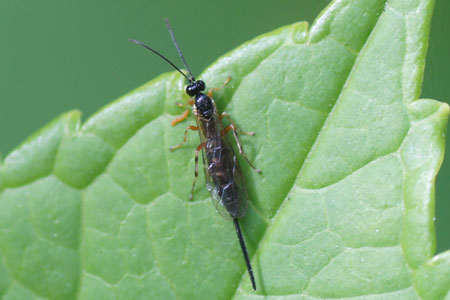 .. ..
 Tribe Ephialtini (Pimplinae). Family Ichneumon wasps,
Ichneumonidae. Tribe Ephialtini (Pimplinae). Family Ichneumon wasps,
Ichneumonidae.
A slender Ichneumon wasp. A name isn't possible.
Photos 2-10-2013. |
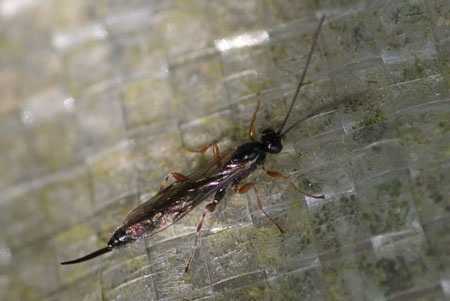 Clistopyga spec.
Tribe Ephialtini (Pimplinae).
Family Ichneumon wasps, Ichneumonidae. Clistopyga spec.
Tribe Ephialtini (Pimplinae).
Family Ichneumon wasps, Ichneumonidae.
A slender Ichneumon wasp of about 7-8 mm. There are three known species in the Netherlands:
Clistopyga incitator, Clistopyga sziladyi, Clistopyga sziladyi. Photos 24-5-2014. |
Tryphoninae
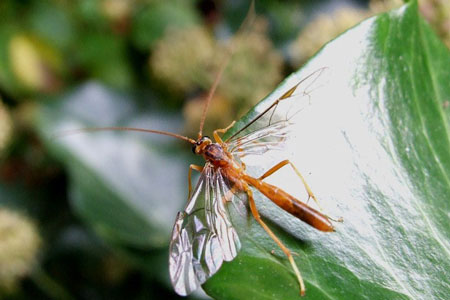 .. ..
 . .
 . .
 . .
 . .
 Netelia spec. Tribe Phytodietini. Subfamily Tryphoninae. Family
Ichneumon wasps, Ichneumonidae.
Netelia spec. Tribe Phytodietini. Subfamily Tryphoninae. Family
Ichneumon wasps, Ichneumonidae.
No Netelia testaceus, for the end of the body of
this species is black. The other species are difficult to identify.
Furthermore, they can also be confused with Ophion species. But the veins of the wings are different.
Photos 13-10-2008. |
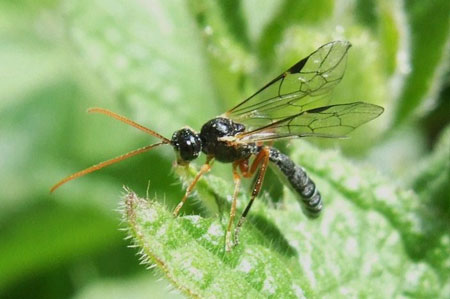 .. ..
 . .  . .  Ichneumon wasp
Perhaps a species of the subfamily Tryphoninae. Ichneumon wasp
Perhaps a species of the subfamily Tryphoninae.
Many members of this family are parasites of the sawfly.
Photos 27-4-2009. |
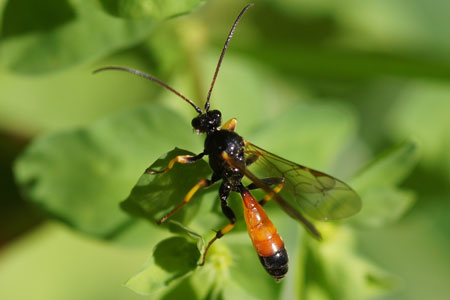 .. ..
 . .
 . .
 . .
 . .
 Cosmoconus meridionator. Subfamily
Tryphoninae.
Family Ichneumon wasps, Ichneumonidae.
Cosmoconus meridionator. Subfamily
Tryphoninae.
Family Ichneumon wasps, Ichneumonidae.
Cosmoconus, but the species remained uncertain for a long time. It resembles Cosmoconus elongator and Cosmoconus ceratophorus. But was identified by Fons Verheyde in 2019 as a Cosmoconus meridionator.
In August I see them flying in the garden. It has a distinctive orange abdomen. The legs are black and yellow. The antennae are dark orange.
Size is approximately 10 mm.
Thanks:
Camille Thirion, Kees Zwakhals and Fons Verheyde. Photos 28-8-2011, 30-8-2011. |
Cryptinae = Gelinae
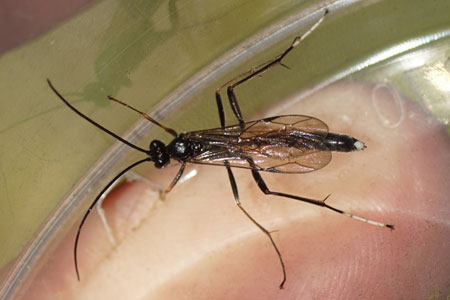 Agrothereutes aterrimus. Male. Subfamily Cryptinae =
Gelinae.
Family Ichneumon wasps, Ichneumonidae.
Agrothereutes aterrimus. Male. Subfamily Cryptinae =
Gelinae.
Family Ichneumon wasps, Ichneumonidae.
A black parasitoid wasp with a white body end in both males and females. Man with white hind leg ends. Photo
11-6-2022. |
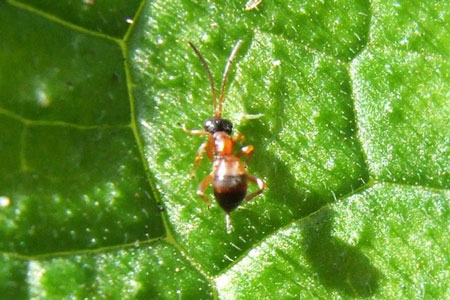 Ichneumon wasp. A small antlike wasp. Maybe subfamily
Cryptinae = Gelinae. Family Ichneumon wasps, Ichneumonidae. Ichneumon wasp. A small antlike wasp. Maybe subfamily
Cryptinae = Gelinae. Family Ichneumon wasps, Ichneumonidae.
On forum "hymis": Henrik Gyurkovics thinks: It could be
fam. Ichneumnidae, subfam.Cryptinae, and there is a remote possibility that it is
some Gelis spec.Thanks Henrik
Some wasps in the genus Gelis are wingless. |
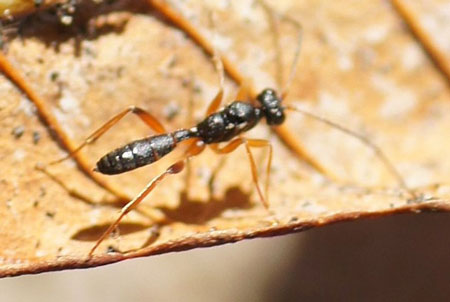 Gelis spec. Subfamily Cryptinae = Gelinae.
Family Ichneumon wasps, Ichneumonidae.
Gelis spec. Subfamily Cryptinae = Gelinae.
Family Ichneumon wasps, Ichneumonidae.
A male. About 3 - 4 mm. Some wasps in the genus Gelis are wingless. Photo
20-10-2014. |
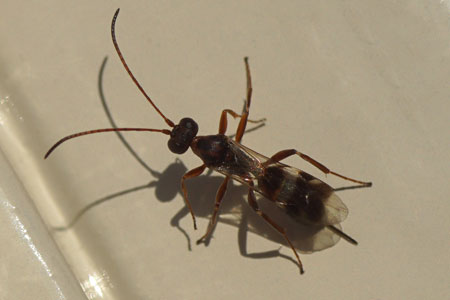 .. ..
 . .  Gelis areator. Female. Subfamily Cryptinae =
Gelinae.
Family Ichneumon wasps, Ichneumonidae.
Gelis areator. Female. Subfamily Cryptinae =
Gelinae.
Family Ichneumon wasps, Ichneumonidae.
Dark striped milky white wings. About 5 mm. There are very similar species. a.o. Gelis liparae. Gelis areator has an orange second tergite. That is only vaguely visible in the detail photo. So not quite sure. Gelis liparae has so far not been seen in the Netherlands. Many different types of hosts.
Photoa 16-12-2021. |
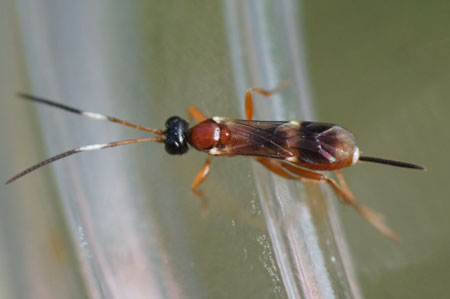 .. ..
 Orthizema hadrocerum. Female.
Subfamily Cryptinae = Gelinae.
Family Ichneumon wasps, Ichneumonidae. Orthizema hadrocerum. Female.
Subfamily Cryptinae = Gelinae.
Family Ichneumon wasps, Ichneumonidae.
A beautiful coloured wasp. About 5 mm.
Photos 20-6-2016. |
Xoridinae.
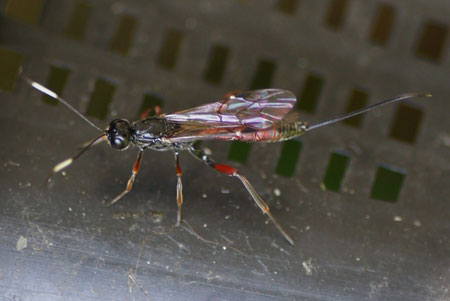 Xorides-cf-fuligator. Subfamily Xoridinae. Family
Ichneumon wasps, Ichneumonidae.
Xorides-cf-fuligator. Subfamily Xoridinae. Family
Ichneumon wasps, Ichneumonidae.
It was sitting in the shade. But I think it's
still a nice photo. Black with red abdomen (not clearly visible on this
photo) and red thighs. Antennae black with white. The ovipositor is bent downwards at the end. They parasitize
the larvae of some species of longhorn beetles.
Approximately 16 mm. May - June. Photos 30-6-2012. |
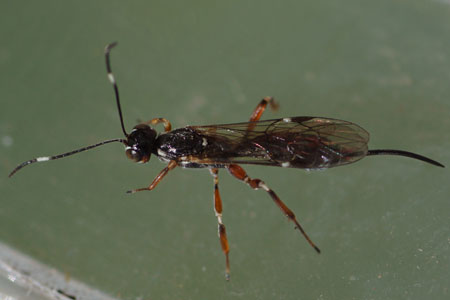 Xorides praecatorius. Subfamily Xoridinae. Family
Ichneumon wasps, Ichneumonidae.
Xorides praecatorius. Subfamily Xoridinae. Family
Ichneumon wasps, Ichneumonidae.
Black with mostly red legs. Striking white "knees". Antennae black with white. The
ovipositor is bent downwards at the end.
They parasitize on the larvae of some species of longhorn
beetles and metallic wood-boring beetles (Buprestidae). 6-15 mm. April - August. Photos 21-7-2019. female |
An example of a difficult Ichneumon wasp.
Subfamily Ctenopelmatinae, Tryphoninae..?
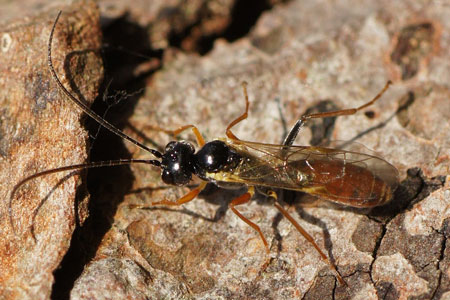 .. ..
 Gergely: This is a difficult one, Ctenopelmatinae/Tryphoninae...
About 1 cm. Very late in the year. Even the subfamily is not possible.
Photos 13-11-2011
Gergely: This is a difficult one, Ctenopelmatinae/Tryphoninae...
About 1 cm. Very late in the year. Even the subfamily is not possible.
Photos 13-11-2011 |
|
Braconidae
Wereldwijd is dit ook een heel grote groep met meer dan 10.000 soorten.
Antennes hebben 17 of meer segmenten. Een slank lichaam.
|
Subfamily Aphidiinae.
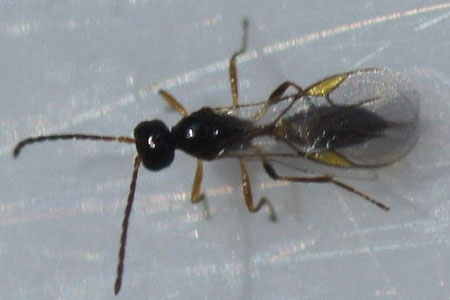 A wasp from the subfamily Aphidiinae. Family
Braconidae.
A wasp from the subfamily Aphidiinae. Family
Braconidae.
A wasp from about 2 mm in the ivy. The big yellow wing stigmas are quite striking.
Wasps from the subfamily Aphidiinae use aphids as their host. The subfamily is divided into
Ephedrini, Praini and Aphidiini. Most species
are from tribes Aphidiini (Aphidius, Diaeretiella, Diaeretus,
Diaeretellus, Lysaphidus, Lysiphlebia, Paralipsis, Pauesia, Protaphidius,
Pseudopauesia, Adialytus, Lysiphlebus, Xenostigmus).
Photo 3-11-2016. |
Subfamily Doryctinae.
Most species parasitize on beetle larvae in wood or under bark.
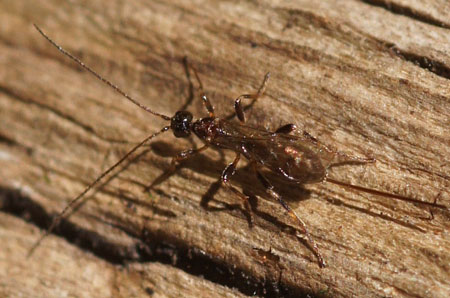 .. ..
 Spathius spec. Subfamily Aphidiinae. Family Braconidae
Spathius spec. Subfamily Aphidiinae. Family Braconidae
A small parasitic wasp from about 4 mm on a rotten plank. It was well camouflaged.
The Dutch expert Kees van Achterberg has written (translated): The
Braconidae wasp is indeed a Spathius (gregarious ectoparasitoiden of beetle
larvae live in wood), but the species can not be determined without the
specimen in your hands. It is a problem group to identify, even if you have
a specimen!
I want to thank Kees van Achterberg and Pietsje, who
has asked about this small wasp to Kees.
Photos: 27-3-2011.
|
Subfamily Euphorinae.
Wasps from this subfamily mainly parasitize on adult hosts from different insect orders, although most species are limited to beetles.
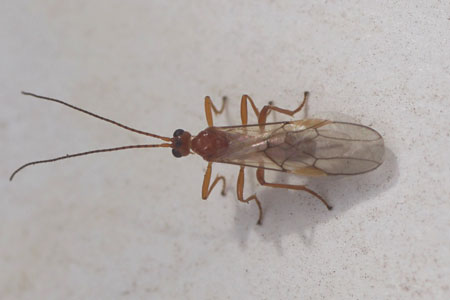 .. ..
 . .  Pygostolus otiorhynchi. Tribe Centistini.
Subfamily Euphorinae.
Family Braconidae.
Pygostolus otiorhynchi. Tribe Centistini.
Subfamily Euphorinae.
Family Braconidae.
An orange wasp. Yellow orange wing stigmas.
They mainly parasitize on adult beetles from the Curculionidae family. The cocoons are attached to twigs and leaves. Photo 1-5-2019. Key to the Holarctic species of the genus Pygostolus Haliday |
Onderfamilie Microgastrinae.
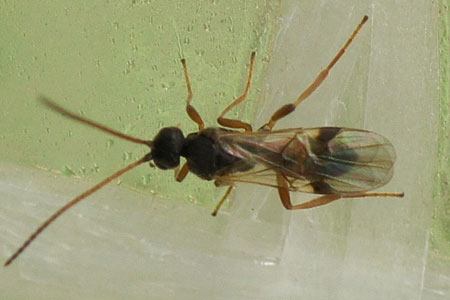 A wasp from the subfamily Microgastrinae. Family
Braconidae.
A wasp from the subfamily Microgastrinae. Family
Braconidae.
A shield wasp of about 3 mm. Large, wide, dark wing stigmas.
Wasps of the Microgastrinae subfamily are small and are usually parasitoids of moths,
butterflies caterpillars In the Netherlands the genera Apanteles, Choeras,
Cotesia, Deuterixys, Diolcogaster, Distatrix, Dolichogenidea,
Glyptapanteles, Hygroplitis, Illidops, Microgaster, Microplitis,
Paroplitis, Pholetesor, Protapanteles, Rasivalva, Sathon, Venanides.
Foto 15-9-2015. |
|
Ceraphronidae and Megaspilidae.
Ceraphronidae Megaspilidae and are both small families, which are closely related. The
wasps can be brachypterous or wingless. The Megaspilidae with wings differ from the Ceraphronidae by a very large stigma in the wing. The larvae are parasites of all kinds of insects. All species are small (up to five mm).
|
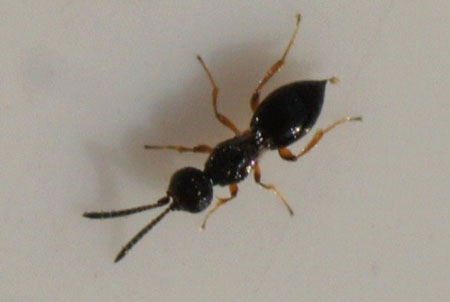 Megaspilidae spec. First there was thought to Ceraphronidae spec. The
species is unknown.
Megaspilidae spec. First there was thought to Ceraphronidae spec. The
species is unknown.
Wingless, very small and dark. It struck me as he walked on a white stool. The wingless species are found
in the soil between the leaf litter. About 2 mm.
Photo 9-10-2012. |
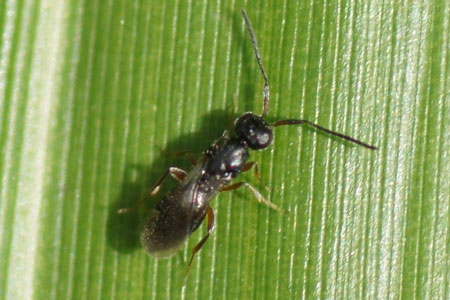 .. ..
 . .
 . .
 Megaspilidae spec.
Megaspilidae spec.
The species is unknown. If you
enlarge the pictures, you can see the clearly visible large stigma in the wing.
Small and dark on a bamboo leaf. About 2 mm.
Photos 2-10-2012. |
|
Chalcid wasps, superfamily Chalcidoidea
There are many species. Most are small and therefore very difficult to identify from a photograph.
The larvae parasitize.
|
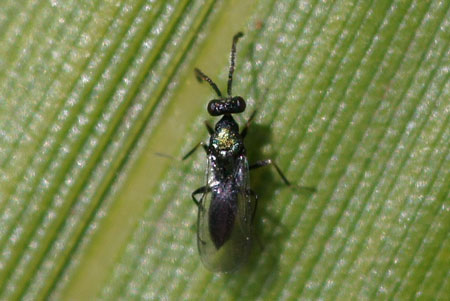 Chalid wasp, family Eulophidae.
Superfamily Chalcidoidea.
Chalid wasp, family Eulophidae.
Superfamily Chalcidoidea.
An approximately 3 mm long wasp with a blue-green sheen.
A
name isn't possible.
Most of Eulophidae are primary parasitoids of concealed larvae, like the larvae inhabiting leaf mines.
Photo 8-4-2014. |
 5-8-2015 Chalid wasp, family Eulophidae.
Male. It can be seen in the branched antenna, which some
males have.
5-8-2015 Chalid wasp, family Eulophidae.
Male. It can be seen in the branched antenna, which some
males have. |
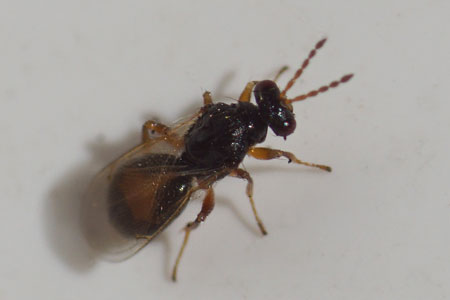 Euplectrus bicolor. Family Eulophidae.
Superfamily Chalcidoidea.
Euplectrus bicolor. Family Eulophidae.
Superfamily Chalcidoidea.
About 2-3 mm. Black with an orange-yellow triangular spot on the abdomen. The females attach their eggs to the outside of caterpillars from different butterfly families. The larvae develop as ectoparasites on the outside of the caterpillars. Many similar Euplectus species occur in warmer areas. Photo 10-8-2019. |
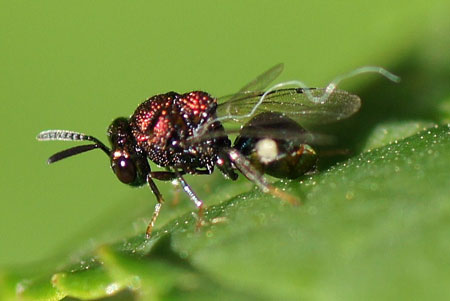 .. ..
 . .
 Chalid wasp, Perilampus
spec Family Perilampidae.
Superfamily Chalcidoidea.
Chalid wasp, Perilampus
spec Family Perilampidae.
Superfamily Chalcidoidea.
3 mm. I found it in the pantry.
Below I have a picture, it was in a cup. After this photo I have put it outside and
have taken more photographs. Metallic and as beautiful as a jewel wasp.
Albert de Wilde told me that there are 11 species in the Netherlands.
Photos 25-9-2011. |
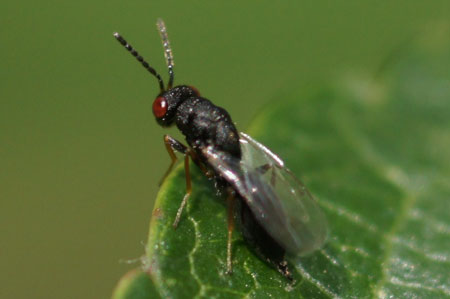 .. ..
 Chalid wasp, family Pteromalidae.
Superfamily Chalcidoidea.
Chalid wasp, family Pteromalidae.
Superfamily Chalcidoidea.
A 3 or 4 mm wasp. Metallic, but different in
colour than my other chalid wasp.
The front and rear tarsus consists of five segments. Length: 1 to 5 mm. Antenna: 8 to 13 segments. Few veins in the wing.
Photos 10-7-2011. |
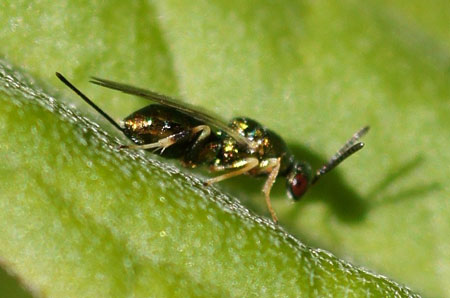 .. ..
 Chalid wasp, family Torymidae. Superfamily
Chalcidoidea.
Chalid wasp, family Torymidae. Superfamily
Chalcidoidea.
A 3 or 4 mm wasp, with a beautiful golden glow. A
name isn't possible. Photos 26-4-2011. |
|
Gall wasps, Cynipidae.
Most females in this group lay their eggs with their ovipositor in plants.
Than the plant galls develop. Ibalia leucospoides, described below, does not lay
their eggs on plants.
|
 .. ..
 Ibalia leucospoides
Family Ibaliidae, Gall wasps (Cynipidae)
In the Netherlands very rare!!!!!
Ibalia leucospoides
Family Ibaliidae, Gall wasps (Cynipidae)
In the Netherlands very rare!!!!!
It is a parasite of wood wasps of the genera
Sirex, Urocerus and
Xeris which live in 'pine'.
A very special wasp. The abdomen is very narrow. It has the wings along its
abdomen. The veins look very different to the veins of other wasps. Antenna female: 13 segments. Male 15
segments.
In the Netherlands there are known are two species: Ibalia leucospoides (Hochenwarth, 1785) and Ibalia rufipes Cresson, 1879. Worldwide there are not too many species.
Length to 15 mm.
Holarctic region; introduced to Australia, New Zealand and South Africa.
Photos 3-8-2011. |
|
Figitidae.
This family is classified in the superfamily Cynipoidea. They are very similar to gall wasps (Cynipidae). However, they are parasitic wasps (not galls). Many small, dark brown to black species of (about 5 mm). All Figitidae are parasitoids of other insect species as larvae.
|
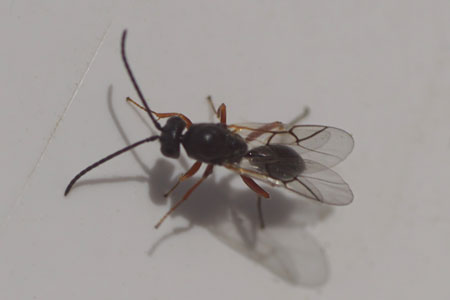 Figitidae. Species unknown. Photo
2-5-2022.
Figitidae. Species unknown. Photo
2-5-2022. |
|
Gasteruptiidae.
Characteristic of this family is that the metasoma
(the posterior part of the body) is very high attached.
The eggs are laid in nests of solitary bees. Antenna segments 13
(males) or 14 (females) The hind tibiae are swollen and there are 3 red bands on the abdomen.
|
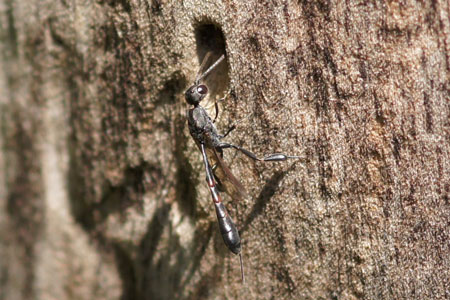 Family Gasteruptiidae.
Probably Gasteruption assectator. Family Gasteruptiidae.
Family Gasteruptiidae.
Probably Gasteruption assectator. Family Gasteruptiidae.
The female has a short ovipositor. Similar to the larger Gasteruption
jaculator. But the female has a long ovipositor. However, there are more species in the Netherlands.
Length 8 - 12 mm. |
Two other species. 
 Photos 27-6-2011 and 4-7-2011
Photos 27-6-2011 and 4-7-2011 |
I want to thank everyone, who has helped me on waarneming.nl and forum.hymis.de
to identify. Especially Camille Thirion, Joël Valemberg, Pierre Nicolas, Gergely
Várkonyi, Gerard Pennards and
Fons Verheyde.
Nederlands /
Dutch
 
Subpage flies:
Tachinidae
Blow-flies
(Calliphoridae) House
flies (Muscidae) Soldierflies
(Stratiomyidae) Root-Maggot
Flies (Anthomyiidae)
Small
flies Gnats
Subpage
wasps, bees, bumblebees: Sawflies
symphyta
Bumblebees
Bee hotel
Leaf-cutter bee
|
